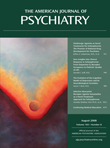To the Editor: We appreciate the comments by Drs. Benazzi and Goldberg. Dr. Goldberg highlights our study’s limitations regarding the apparent decrease in rapid cycling over the course of the follow-up year and the difficulty in knowing the true cause-effect relationship between the use of antidepressants and cycling rates. We recognize that comparisons of retrospective and prospective rates of rapid cycling are methodologically limited, although the majority of studies of rapid cycling have used similar naturalistic methodologies
(1) . In our view, naturalistic studies have their place in evaluating the association between antidepressant use and cycling patterns, although they do not provide the internal controls afforded by randomized trials.
Dr. Benazzi raises thought-provoking questions regarding risk factors for cycling. Are patients who experience “mixed depression” or subsyndromal mixed states more likely to cycle when they are treated with antidepressants? We emphasize that the numbers presented in Table 3 of our article represent group means for Young Mania Rating Scale and MADRS scores at study entry. These data do not imply that each patient, or even the majority of patients, suffered concurrently from mixed symptoms. Nonetheless, in response to Dr. Benazzi’s comments, we tabulated the number of patients who were experiencing subsyndromal mixed states during the 2 weeks prior to study entry, defined as a Young Mania Rating Scale score ≥10 and a concurrent MADRS score ≥12. Of the original 1,191 patients who completed 1 year of treatment, 208 patients met these criteria for mixed depression at study entry. These patients were only slightly more likely to receive antidepressants during the follow-up year (136/208 patients [65%]) than patients without mixed presentations at study entry (594/983 [59%]). Furthermore, only 26 (19%) of the 136 mixed depressive patients who were exposed to antidepressants had the clinical status of mixed episode or rapid cycling during the follow-up year. Thus, it appears that the relative contribution of this mixed depressive group to the overall rate of rapid cycling was relatively small.
The use of antidepressants to treat mixed depression has been addressed in a previous STEP-BD study, conducted by Dr. Goldberg et al., in which patients with bipolar depression, accompanied by at least two manic symptoms (448 of 2,000 patients), were found to have higher mania severity scores at the 3-month follow-up relative to patients with pure depression
(2) . Furthermore, antidepressants did not hasten time to recovery relative to mood stabilizers alone in this subgroup of patients. Dr. Goldberg et al. concluded that the co-occurrence of subsyndromal manic symptoms with full depressive symptoms was a poor prognostic indicator of short-term response to antidepressants. However, the 3-month time frame of their study did not allow for an examination of cycling rates.
The comments by Drs. Goldberg and Benazzi underscore the complexity of issues regarding the use of antidepressants in treating bipolar patients. A major finding of STEP-BD was that antidepressants appear to have no benefit beyond that of mood stabilizers alone in the treatment of bipolar depression, despite their frequent use in practice
(3) . Which bipolar patients should receive antidepressants, under what conditions, and for what duration remain issues that warrant more refined studies.

